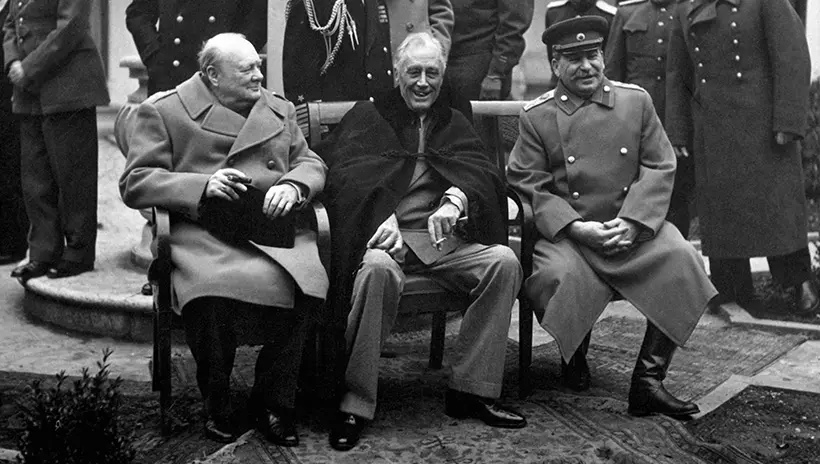A Historical Spotlight from Issues & Controversies in History:
YALTA AGREEMENT: Did Roosevelt and Churchill Succeed in Achieving the Best Deal Possible?
Did Roosevelt and Churchill succeed in negotiating the best deal possible at Yalta? Be sure to check out Issues & Controversies in History’s complete and unbiased coverage of this issue. Learn more about the issue and check out a sample of the pro/con arguments on both sides below.
Try Issues & Controversies in History today!
THE ISSUE
With World War II coming to a close in early 1945, U.S. president Franklin D. Roosevelt, British prime minister Winston S. Churchill, and Soviet premier Joseph Stalin met in the Crimean resort city of Yalta to refine and coordinate their separate strategies for the final defeat of Nazi Germany and the restoration of national governments in liberated Europe. Each head of state, informed by a different vision, aimed to secure the best possible outcome for his own nation. In speeches to Congress and Parliament, respectively, Roosevelt and Churchill later claimed to have achieved precisely that. Almost as soon as the conference ended, however, Roosevelt and Churchill came under heated criticism for having failed in their mission, in particular with respect to Polish borders and to the establishment of representative governments in Eastern Europe and Poland. Did Roosevelt and Churchill get the best possible deal from Stalin?
Arguments that Roosevelt and Churchill Succeeded in Negotiating the Best Deal Possible:
Arguments that Roosevelt and Churchill Failed to Negotiate the Best Deal Possible:
By the time of the Yalta Conference, Roosevelt and Churchill held weaker bargaining positions than Stalin. They faced a skilled negotiator who was in a position to realize his goals without their approval, because the Soviet army already occupied and controlled much of Eastern Europe. Since they needed Stalin’s help to arrange a European settlement, create the United Nations, and defeat Japan in Asia, they had to offer Stalin incentives to cooperate with them. Inflexible demands for concessions in Poland and Eastern Europe would have endangered not only their postwar plans but even their national security if Stalin had decided instead to reach a separate settlement with Germany. Since Stalin’s chief demand for pliable regimes applied to territories the Soviet army already controlled, no better outcome was possible.
Roosevelt and Churchill ceded Polish interests, abandoned Eastern Europe, and gave up parts of Japan and even friendly Chinese territory to the Soviets. In return, Stalin agreed to the creation of the United Nations, gave vague promises of free elections in Poland and Eastern Europe, and confirmed his intention to declare war on Japan. Free elections were never held, however, and Stalin imposed a communist government on the Polish people. The Soviet Union did declare war against Japan three months after Germany’s defeat as agreed, but the declaration came only days before the Japanese surrender, too late to make any difference. Further, Stalin’s approval of the United Nations hinged on the Soviet Union being given multiple votes in the body, one vote for each of the 16 “republics” that made up the Soviet Union. At Yalta, he retreated from the demand, but Roosevelt and Churchill still allowed the Soviet Union three votes, violating the one nation, one vote principle.
Issues & Controversies in History links this pro/con article to rich related resources that enhance the debate. Students and researchers can delve into primary sources that provide context, a topic-specific timeline, a bibliography, and a thought-provoking “What if…” section that explores what might have happened had people made different choices. Plus, discussion questions are provided to inspire critical thinking and analysis.
What Is Issues & Controversies in History?
Issues & Controversies in History places students at the center of the great debates and conflicts in U.S. and world history, exploring the issues as the key players saw them or, in some cases, as historians have interpreted them. This comprehensive reference database delivers dynamic, concise, and balanced coverage of a broad range of topics, from slavery, empire, and revolution to race, gender, economy, and disease, all over the globe. By building a deeper understanding of how historical events and conflicts have influenced U.S. and world history over the past 5,000 years, Issues & Controversies in History is a powerful tool for helping researchers analyze primary sources, answer document-based questions, and prepare for history debates and research projects.
Click here to take a free trial of Issues & Controversies in History.
See also:
- Equal Rights Amendment: A Historical Controversy from Issues & Controversies in History
- Keating-Owen Child Labor Act: A Historical Controversy from Issues & Controversies in History
- The Comanches: A Historical Controversy from Issues & Controversies in History
- For Primary Sources, Make Infobase Your First Stop



